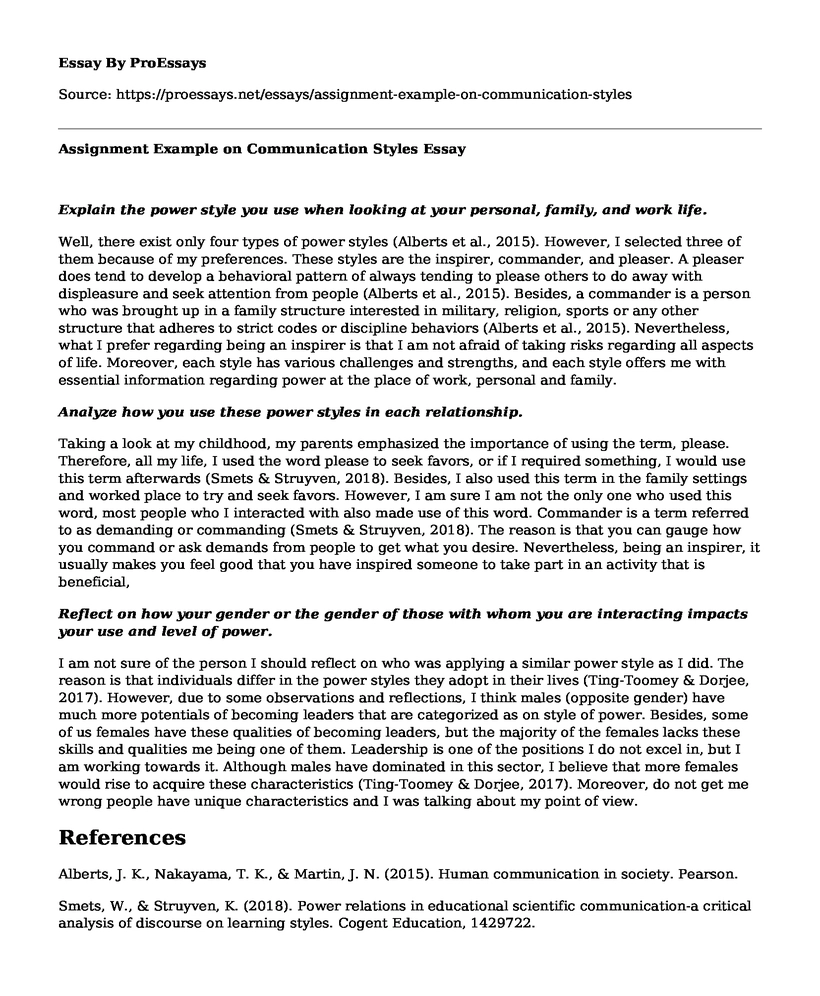Explain the power style you use when looking at your personal, family, and work life.
Well, there exist only four types of power styles (Alberts et al., 2015). However, I selected three of them because of my preferences. These styles are the inspirer, commander, and pleaser. A pleaser does tend to develop a behavioral pattern of always tending to please others to do away with displeasure and seek attention from people (Alberts et al., 2015). Besides, a commander is a person who was brought up in a family structure interested in military, religion, sports or any other structure that adheres to strict codes or discipline behaviors (Alberts et al., 2015). Nevertheless, what I prefer regarding being an inspirer is that I am not afraid of taking risks regarding all aspects of life. Moreover, each style has various challenges and strengths, and each style offers me with essential information regarding power at the place of work, personal and family.
Analyze how you use these power styles in each relationship.
Taking a look at my childhood, my parents emphasized the importance of using the term, please. Therefore, all my life, I used the word please to seek favors, or if I required something, I would use this term afterwards (Smets & Struyven, 2018). Besides, I also used this term in the family settings and worked place to try and seek favors. However, I am sure I am not the only one who used this word, most people who I interacted with also made use of this word. Commander is a term referred to as demanding or commanding (Smets & Struyven, 2018). The reason is that you can gauge how you command or ask demands from people to get what you desire. Nevertheless, being an inspirer, it usually makes you feel good that you have inspired someone to take part in an activity that is beneficial,
Reflect on how your gender or the gender of those with whom you are interacting impacts your use and level of power.
I am not sure of the person I should reflect on who was applying a similar power style as I did. The reason is that individuals differ in the power styles they adopt in their lives (Ting-Toomey & Dorjee, 2017). However, due to some observations and reflections, I think males (opposite gender) have much more potentials of becoming leaders that are categorized as on style of power. Besides, some of us females have these qualities of becoming leaders, but the majority of the females lacks these skills and qualities me being one of them. Leadership is one of the positions I do not excel in, but I am working towards it. Although males have dominated in this sector, I believe that more females would rise to acquire these characteristics (Ting-Toomey & Dorjee, 2017). Moreover, do not get me wrong people have unique characteristics and I was talking about my point of view.
References
Alberts, J. K., Nakayama, T. K., & Martin, J. N. (2015). Human communication in society. Pearson.
Smets, W., & Struyven, K. (2018). Power relations in educational scientific communication-a critical analysis of discourse on learning styles. Cogent Education, 1429722.
Ting-Toomey, S., & Dorjee, T. (2017). 7 Multifaceted identity approaches and cross-cultural communication styles: Selective overview and future directions. Intercultural Communication, 9, 141.
Cite this page
Assignment Example on Communication Styles. (2022, Jun 19). Retrieved from https://proessays.net/essays/assignment-example-on-communication-styles
If you are the original author of this essay and no longer wish to have it published on the ProEssays website, please click below to request its removal:
- Patterns and Trends in Poverty and Affluence by Race and Ethnicity
- Anthropology of Gender Essay
- Paper Example on Effective Interpersonal Communication
- The Importance of Groups to Christian Leadership Essay
- Essay Sample on the 1920s Flappers
- Chinese Immigrants Create Refuge in Chinatown: New York's Ethnic-Based Community - Essay Sample
- Paper Example on Mobile Tech: Revolutionizing Communication in Science







